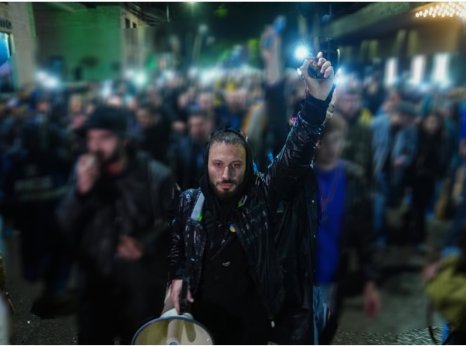Georgia: Justice For Tortured Georgian Protester

Saba Skhvitaridze, an activist and a member of the opposition political party Akhali, has been publicly critical of the government and actively involved in anti-government and pro-European protests in Georgia since 2024. Saba Skhvitaridze was arrested on the night of 5 December 2024 after attending an opposition party meeting. He is being accused of assaulting a police officer with a baton, causing head injuries. The incident reportedly occurred as a group of masked individuals confronted activists and politicians following their meeting. One of the masked men slapped a woman activist after she attempted to remove his hood to identify him. Clashes ensued as Saba Skhvitaridze and other activists intervened to restrain and confront the masked man, who was later identified as a police officer. The police made no arrests during the confrontation but arrested Saba Skhvitaridze the following day.
Saba Skhvitaridze’s arrest and subsequent treatment appears to be retaliatory, aimed at punishing him for participating in protests and creating a wider chilling effect to deter others from joining the protests. From the outset, his case has been marked by unlawful and retaliatory actions by the state authorities, consistent with a broader pattern of using the criminal justice system to suppress dissent.
Saba was reportedly stopped without an arrest warrant, denied an explanation for his arrest, and his whereabouts were concealed for over five hours. Police officers confiscated the phones of Saba and his father, effectively preventing documentation of the arrest and obstructing access to legal representation. The refusal to register the arrest and the denial of access to legal counsel further question the legality of Saba’s arrest and point to deliberate attempts to isolate and intimidate him.
While in custody, Saba was beaten and threatened for having allegedly assaulted a police officer. He was pressured to sign a “confession” and denied access to medical care despite his injuries and severe pain. A forensic report confirmed that his injuries were consistent with torture, but his formal recognition by the authorities as a victim of torture has been delayed and there has been no progress into the investigation of his allegations of torture and other ill-treatment after more than six months.
Saba Skhvitaridze is being held in a high-security prison typically reserved for convicted individuals and those serving life sentences. He is being held in solitary confinement without meaningful human contact, in conditions that may also amount to torture or other ill-treatment that further point to the punitive nature of his detention.
His trial has also been marred by serious violations of safeguards for a fair trial: despite presenting visible injuries and a detailed account of torture and other ill-treatment at his initial court appearance. The judge disregarded these claims and ordered his pre-trial detention following a summary hearing without duly assessing the risks or deliberating on proportionality, necessity, or alternative measures. The court also excluded the presence of journalists and members of the public before delivering its decision.
The court also failed to address significant inconsistencies in the prosecution, including in witness statements, police protocols and medical reports. Saba’s defence has also complained about their inability to properly cross-examine law enforcement witnesses who have repeatedly evaded questions in an attempt to undermine the defence’s ability to challenge the evidence.
While Saba remains in prison and faces criminal prosecution for allegedly inflicting injuries to a police officer, no law enforcement officials have been identified, investigated or held accountable for the allegations of torture and other ill-treatment. The treatment of Saba Skhvitaridze exemplifies systemic violations of the right to a fair trial, including the use of torture and other forms of ill-treatment to prosecute protesters as a tool for punishment and intimidation. His case reflects a broader pattern of abusing the criminal justice system in Georgia, where law enforcement officers accused of using force unlawfully, including to torture and otherwise ill-treat protesters, enjoy impunity while protesters are tortured, prosecuted and detained in unfair trials.